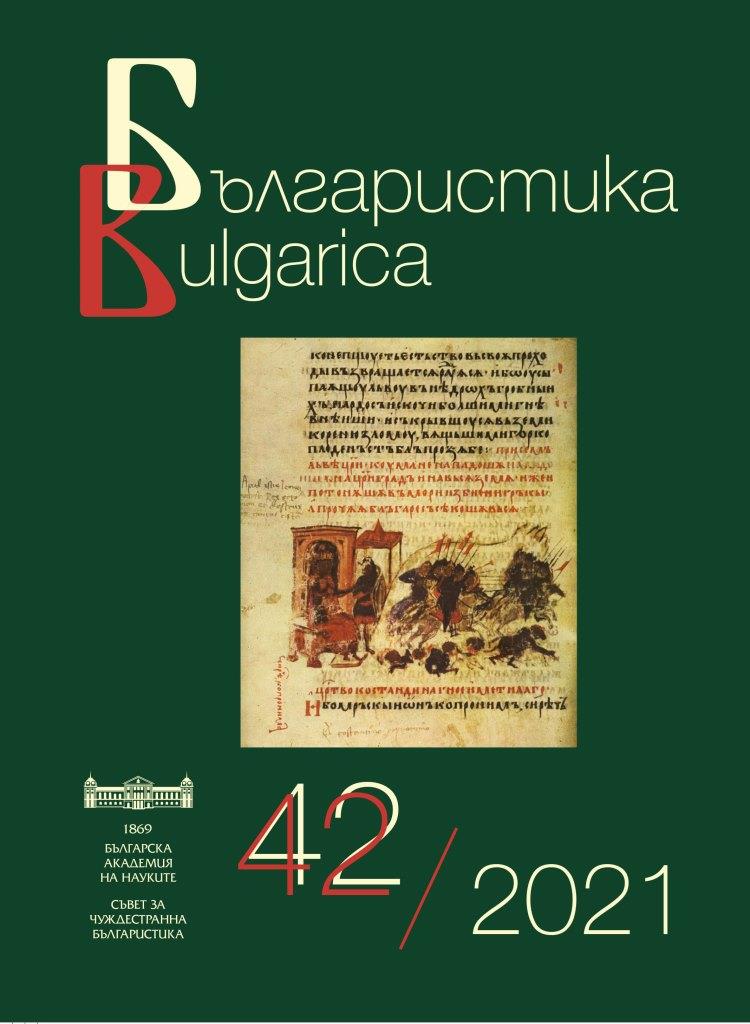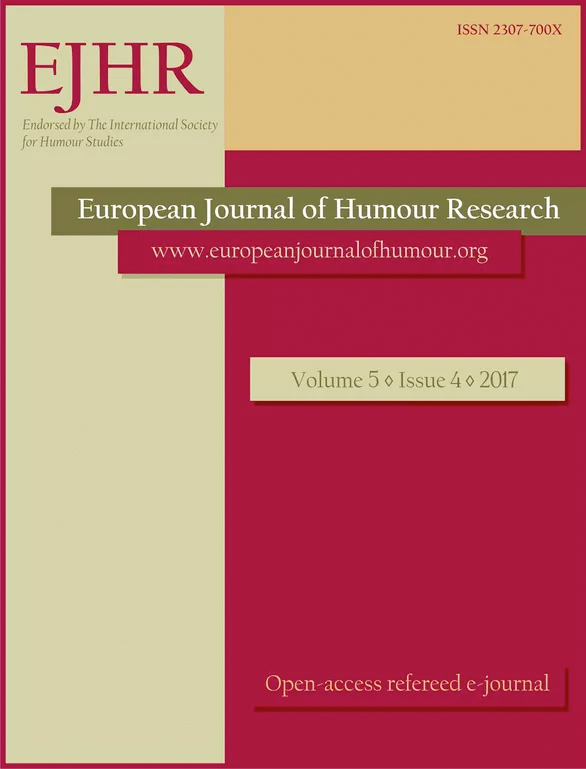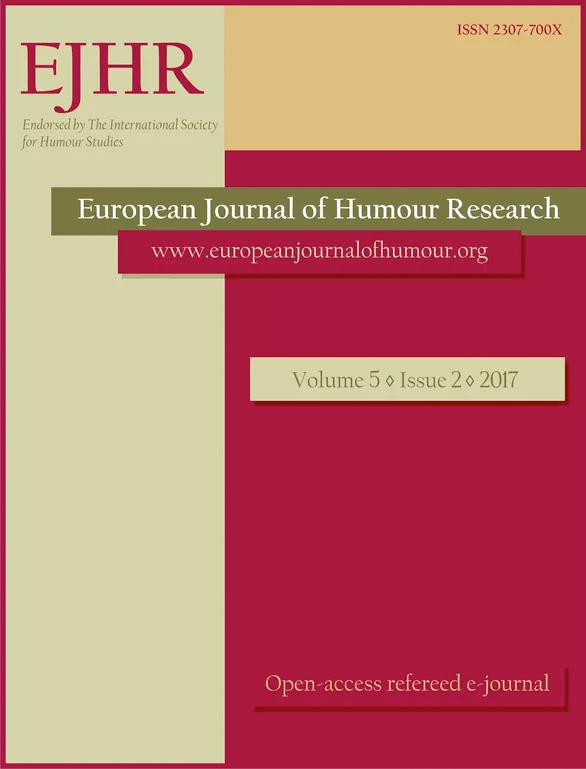
Периодика 2020 – 2021
Content of the main Bulgarian scientific journals for the current year in linguistics, literature, history, folklore, ethnography, archaeology and art studies.
More...We kindly inform you that, as long as the subject affiliation of our 300.000+ articles is in progress, you might get unsufficient or no results on your third level or second level search. In this case, please broaden your search criteria.

Content of the main Bulgarian scientific journals for the current year in linguistics, literature, history, folklore, ethnography, archaeology and art studies.
More...

Defended Ph.D. theses in Bulgaria in the field of linguistics, literature, history, folklore, ethnography and art studies.
More...
Data about scientific events in the field of the humanities in Bulgaria in 2021.
More...



The aim of the paper is to identify the characteristic features of jokes about Polish highlanders and analyse them to isolate the comic script of a highlander. This group of jokes is treated as a good illustration of Christie Davies’s ethnic jokes theory concerning canny versus stupid and centre versus periphery oppositions, as well as mind over matter. A particular type of reasoning and the use of regional dialect are distinctive features of the joke targets that make it possible to perceive these jokes as a culturally specific phenomenon. The head shepherd (called baca) is the key character of the cycle. He is a very down-to-earth person, who is proud of his practical wisdom and has a very relaxed attitude to life—a wise fool in some jokes, thus even resembling Good Soldier Švejk in some respects. His lifestyle is usually contrasted with that of ceper—a town dweller, coming to the highlands as a tourist—treated as a kind of intruder who asks stupid questions and does not know how to appreciate life and what really matters in it. The jokes about highlanders are analysed within the paradigm of General Theory of Verbal Humour, and particularly its reasoning and reversal Logical Mechanisms. Even though Christie Davies treated the Logical Mechanism with some scepticism, claiming it is of no use in the GTVH (Davies 2004, 2011b), he would not probably mind the logic of highlanders’ utterances and behaviour being analysed. We believe he may even have enjoyed that.
More...
Christie Davies, the renowned humour researcher and a passionate propagator of the comparative method in studying jokes, stressed the necessity of establishing a relationship between two sets of social facts: the jokes themselves on the one hand, and the social structure or cultural traditions wherein they disseminate on the other (Davies 2002: 6). He also inspired others to examine the differences and similarities in the patterns of jokes between different nations, social circumstances and eras. By doing this and building falsifiable models and generalisations of joking relationships, he changed the way we look at and analyse ethnic jokes.This study returns to earlier findings of Estonian (Laineste 2005, 2009) and Belarusian (Astapova 2015; Zhvaleuskaya 2013, 2015) ethnic jokes and takes a look at new trends in fresh data. Starting with the jokes from the end of the 19th century and ending with the most recent jokes, memes and other humorous items shared over the Internet, the paper will give an overview of how social reality interacts with the rules of target choice, above all describing the effect of globalisation on jokelore.
More...
The present study attempts to combine Raskin’s (1985) and Davies’ (2011) methodological approaches to political jokes to investigate Greek political jokes targeting politicians and circulated during the first four years of the Greek crisis. The proposed analysis identifies, on the one hand, what Greek people perceive as politicians’ main incongruities, namely their flaws that prevent them from fulfilling their roles ‘appropriately’. On the other hand, the particularities of the sociopolitical context in Greece and, most importantly, the pervasive lack of political trust among Greeks allow for an interpretation of the jokes under scrutiny as expressions of disillusionment and disappointment with politicians and the political system in general, and as manifestations of mild, playful aggression towards them. The findings of the study reveal that the accusations raised in the jokes against politicians capture and reproduce quite accurately most of the aspects and causes of political mistrust in Greece.
More...
In How to Do Things with Words (1962), the philosopher John Austin claimed that we use words to do things in the world, not merely to express a state of affairs. This proposal introduced speech acts, and essentially initiated the study of linguistic pragmatics. Speech acts in everyday communication include persuading, apologizing, criticizing, humiliating, complimenting and a host of other intended behaviours. Austin accentuated the idea of speaker intention, on one hand, and hearer’s response to that intention if successfully conveyed, on the other. We consider some of the speech acts used in the work of selected standup comedians to analyse the way they determine the relationship of performer and audience. We argue that there is a reciprocal relationship between the licensing of certain speech acts in standup comedy, and the success of these speech acts in shaping the social lives of the audience. We show that this relationship is at the forefront of standup comedy’s social impact and that it can generate heightened consciousness of the social and political environment of the time. Finally, we consider the question of whether socially critical standup can have any noticeable effect on the attitudes or behaviour of both live and digitally mediated audiences.
More...
The aim of the paper is to uncover the extent to which different forms of political Internet humour can criticise current political affairs in a developing democracy such as Bosnia and Herzegovina. Specifically, applying a cognitive linguistic theory of meaning construction, namely conceptual integration theory, the paper analyses the construction of meaning of humorous Internet forms, such as memes, demotivational posters, hashtag posts, and memetic photographs, representing innovative ways of providing political commentaries on current political affairs. The meaning of political humour is constructed in conceptual blending as a basic cognitive mechanism. As it is claimed (Coulson & Pascual 2006, Coulson & Oakley 2006, Coulson 2006, Oakley & Coulson 2008) that blending can be used as a rhetorical tool influencing the audience to change the reality and even act upon it, the analysis of the construction of meaning of political humour as products of conceptual integration can reveal hidden ideologies in political discourse.
More...
This study investigates the diffusion of a new political language based on humour and irony into Turkish politics. The Taksim Gezi Park Protests, in addition to introducing a new subject to Turkish politics, led to a new language that places humour at the centre. The Government’s neoliberal and authoritarian policies and tight control over traditional media shaped the resistance to be humoristic and indirect. People used alternative media to voice their dissent, mainly in the form of social media messages in addition to street performances, graffiti, videos and murals. This new wave of humour, which I prefer to call the “public square humour” emphasised creativity, improvisation and pluralism via the usage of traditional conversational humour mechanisms of the Turkish folk narratives. I investigate the effect of this new wave of humour on the professional politicians over the course of following years after the protests in an increasingly authoritarian political climate. I analyse the Twitter messages of four major party leaders and politicians who are active in Twitter, both qualitatively and quantitatively. With the methods of the discourse analysis I identify the political parties that embrace the new language of the political opposition. Finally, I conclude that Demirtas embraces the public square humour better and makes use of it to underline the transformation of HDP (People’s Democratic Party) from a defendant of ethnic politics to the representative of the new voice of Turkish political opposition.
More...
Over the past century Belarus has experienced a dramatic increase in educational level. Obtaining secondary education is now considered normal, getting a university degree is prestigious. However, such an attitude is relatively new to Belarusian society. Joke texts that date back to the 19th and the beginning of the 20th century indicate that formal education was widely considered useless, as it did not equip children with skills they needed in real life. Formal education was often contrasted with learning necessary skills at home, invariably in favour of the latter. In the Soviet era, formal education was made compulsory and suddenly became an integral part of people’s lives, but it still lacked a link with children’s future careers. Parents could not always appreciate the benefits of education, but had to send their children to school anyway. The clash between the “old” attitude and the “new” reality produced jokes. Jokes that have emerged in the post-Soviet era reflect the omnipresence of education in contemporary Belarusian society. Some school jokes point to a greater understanding of the value of knowledge in modern children―yet it is often not the formal knowledge they are expected to get in school. Overall, school in jokes has become a setting where issues prominent in society at large come to the fore, even if this goes against the will of the educators.
More...
Ethnic jokes are a form of comical narration extremely widespread throughout the social life of various nations. They generally centre on neighbouring nations and reveal a positive assessment of one's own ethnic group, usually negatively evaluating other nations. The subject of the analysis is jokes about Montenegrins, who are known in the Balkans for their laziness and slow lifestyle. However, they are able to transform this unfair stereotype into an advantage, a cultural identifier, which is reflected in popular culture, numerous jokes and tourist promotion of the country.
More...

This article is the first study that researches the combination of three components: humour, food and fashion. It is based on an analysis of three unique fashion shows whose designer is the American Jeremy Scott; two under his brand, and the third as an art director for the Italian brand Moschino. The three shows connect these three components, while presenting the culmination of a food-humour theme in contemporary fashion, which had started with Moschino’s brand founder, Franco Moschino, in the nineties. Combining food and fashion is relevant in contemporary culture as it compares consumption of fast food to that of fast fashion. The link between laughter and food is ancient. A few days after birth, there are buds of a smile on a baby’s face, expressing its satisfaction with food. Smiles and even laughter often occur throughout a person’s life in the context of delicious food. The uniqueness of the above-mentioned fashion shows is not humour in itself, but rather its combination with food and fashion, the two seemingly different. The combination of these three components creates a cognitive challenge for the fashion spectators. We thus argue that this threesome constitutes an important, creative breakthrough in fashion. One of humour’s important functions is to challenge social, cultural and aesthetic norms. As thus it has been infiltrated into fashion shows since the 1980s, as a norm-breaker, but also as a marketing strategy. This article discusses the cultural function of food and humour in fashion shows, from a cultural semiotic methodology.
More...

